|






Click the flag
Meet our special
U.S. Publishers
|
Health & Medical Care / Special Needs
Back to Family Health Index
Featured
Books in this Category / Main
Booklist

Featured
Books
|
The ADHD and Autism Nutritional Supplement Handbook. Dana
Goodbout Laake & Pamela Compart, $24.99
Many children diagnosed with ADHD or autism have
nutritional or metabolic inefficiencies. This detailed and practical book will
help you find out if your child is one of those suffering from this condition,
and learn how you can drastically improve your child’s symptoms and
wellbeing. Doctor-nutritionist team Pamela Compart, M.D. and Dana Laake,
R.D.H., M.S., L.D.N., reveal how to properly and safely implement supplements
and dietary changes. |
|
Aspies on Mental
Health: Speaking for Ourselves. Luke Beardon & Dean
Worton, Editors, $31.95
People with Asperger Syndrome (AS) can be particularly at risk of developing mental health difficulties such as anxiety and depression. Here, adults with Asperger Syndrome speak out about their own experiences of mental health issues, offering sound advice for other Aspies and providing valuable insights for family, friends and also for mental health professionals.
Touching on everything from difficulties at work and college to coping with low self-confidence, self-harm, alcohol, misdiagnosis, sectioning, counselling, medication and battles with mental health services, the book provides a window into how people with AS experience mental health issues, and what can be done to help. The individual accounts describe innovative coping strategies and methods for maintaining emotional and psychological wellbeing as well as practical advice on things like how to stay positive and deal with day-to-day stress and meltdowns. |
|
Autism and Its
Medical Management: a Guide for Parents and Professionals.
Michael Chez, $24.95
Bridging the communication gap between medical professionals and parents, this book offers accessible explanations of medical terminology and treatment relevant to Autism Spectrum Disorders and is an important tool for parents and professionals working with children with ASDs. |
Back to top
|
Caring for Children with Special
Healthcare Needs and Their Families: a Handbook for Healthcare Professionals. Edited by Linda Eddy, $65.99
This book addresses the challenges of
providing optimal care for the special needs population. More than just a book
about caring for patients, the text stresses the importance of caring for their
families as well. |
|
A Child in Pain: What Health Professionals Can Do to Help. Leora Kuttner, $68.95
This comprehensive book is designed to help child health professionals of all disciplines gain understanding and skill in how to approach and treat children’s pain, and help children understand and cope with their own pain. The book examines children’s fears and anxieties that accompany their need for pain relief, and gives health professionals communications skills and words to calm these fears. |
|
Children with School Problems: a
Physician’s Manual. Debra Andrews & William
Mahoney, Editors, $60.00
Doctors must be able to identify,
diagnose, treat, and manage children who are struggling in school. The first
book specifically tailored for the needs of physicians working with kids with
learning disabilities, CHILDREN WITH SCHOOL PROBLEMS: A PHYSICIAN'S
MANUAL covers such important areas as child development, diagnosing
learning disabilities (including data gathering, screening and assessment, and
physical examinations), management (medication, behavioral management, and
educational interventions), and prevention (including literacy promotion).
Written by trusted experts from the
Canadian Paediatric Society, CHILDREN WITH SCHOOL PROBLEMS is filled
with practical tools and resources that physicians—including paediatricians,
family physicians, and paediatric learners—can use to diagnose and treat
children with learning disabilities. |
Back to top
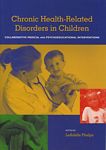
|
Chronic Health-Related Disorders in Children: Collaborative Medical and Psychoeducational Interventions. LeAdelle Phelps, editor. $91.50
This engagingly written text provides current diagnostic and treatment information on a broad range of chronic health-related disorders that tend to be first diagnosed in childhood. A group of widely recognized psychologists and experts in their respective fields address common ailments, such as intestinal and respiratory disorders, as well as less frequent but challenging disorders such as neurocutaneous syndromes and disorders arising from sex chromosome anomalies. Two introductory chapters frame the overarching themes for psychologists by discussing contemporary issues in collaborative practice and service delivery.
Fourteen chapters provide concise and current reviews of specific disorders, including cancer, kidney disease, endocrine disorders, and craniofacial anomalies. Each chapter defines the disorder, reviews etiology and risk factors, and provides prevalence data; outlines the behavioral, medical, psycho-educational, and socio-emotional consequences of the disorder; and presents evidence-based interventions that are intended to mitigate the negative outcomes of the disorder and improve the life-long functioning of children with chronic health-related disorders. The comprehensive medical discussions are tailored for psychologists. |

|
The Disconnected Kids Nutrition Plan: Proven
Strategies to Enhance Learning and Focus for Children with Autism, ADHD,
Dyslexia, and Other Neurological Disorders. Robert Melillo, $22.00
Dr. Robert Melillo's Brain Balance program has helped
thousands of families, offering a drug-free, scientifically based method for
addressing a wide range of conditions, including autism spectrum disorders and
ADHD. In this new book, he presents the nutritional side of the Brain Balance
Program, featuring guidelines, tips, and kid-friendly recipes based on the
latest scientific research on how food affects the brain. Designed to help busy
parents feed picky kids in a beneficial way, the book will show readers how to:
- Recognize the difference between a fussy eater and a problem
eater.
- Ease the sensory issues that make for mealtime mayhem.
- Identify food sensitivities using a simple elimination diet.
- Choose supplements that will help ensure adequate daily amounts
of the specific vitamins and minerals important to brain health.
- Prepare delicious, healthy meals that will pass the taste test of
even the most finicky eaters.
- Understand how the brain plays a primary role in many dietary and
nutritional issue including food sensitivities.
|
Back to top
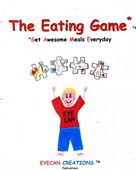
|
The Eating Game: Get Awesome Meals Everyday. Jean Nicols, $79.95 
After more than 25 years working with children with Autism and witnessing the difficulties many of them have with eating healthy meals, Jean Nicols decided the time had come for a creative solution to this challenge. The result is The Eating Game, a unique planning kit based on recommendations made in Canada’s Food Guide, for children, adolescents and adults.
Using Velcro-backed pictures of a wide variety of foods form all the food groups, the kit creates a visual support that helps the user to actively participate in daily food planning. The routine of using the kit to plan the next day’s meals provides a structure that should have positive results day after day and make mealtime more relaxing and rewarding for the whole family. |
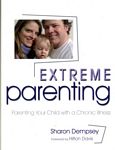
|
Extreme Parenting:
Parenting Your Child with a Chronic Illness. Sharon Dempsey,
$27.95
Extreme Parenting is a solid source of support for parents of children with long-term illnesses. The guide is packed with practical advice, models of exploration and lists of action points, and will empower parents to be good advocates for their children. It also provides health professionals with invaluable insights into the demands of living with chronic illness. |
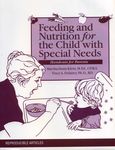
|
Feeding and Nutrition for the Child with Special Needs: Handouts for Parents. Marsha Dunn Klein & Tracy Delaney, $165.00
When working with the feeding and nutrition concerns of parents children of all ages, OTs, therapists and home care visitors can refer to this library of handouts for information on how and what to feed children with special needs. Select from 195 reproducible, illustrated handouts that guide parents in their understanding and implementation of therapy programs. All handouts are cross-referenced with a list of related materials to supplement educational activities. Customize recommendations by adding individual information in the special instructions section provided in each handout. |
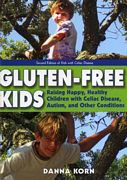
|
Gluten-Free Kids: Raising Happy, Healthy Children with Celiac Disease, Autism and Other Conditions. Danna Korn, $27.50
As public awareness has grown about the gluten-free (GF) diet being a requirement for anyone with celiac disease, so has evidence that suggests the diet can help improve other conditions; it seems to reduce the symptoms of autism, and helps diabetics lower their glycemic index. The author’s conversational, can-do attitude gives anyone the confidence and know-how to manage the challenges of the GF diet, especially those who need to maintain the diet for a lifetime. Parents, doctors, dietitians and other medical professionals who prescribe GF diets will find this a useful and practical resource. |
Back to top
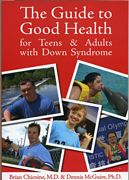
|
The Guide to Good
Health for Teens & Adults with Down Syndrome. Brian
Chicoine & Dennis McGuire, $35.99
The authors of the bestselling Mental Wellness in Adults with Down Syndrome turn their attention to the physical health of teens and adults with Down syndrome. Drs. Chicoine and McGuire provide invaluable insight into what health problems are more common in their patients, and how medical issues can “present” differently in people with Down syndrome. In a clear, empathetic style, they discuss how to promote a healthy lifestyle to prevent problems, and how to recognize health problems early on to ensure appropriate care and the best outcome. The Guide to Good Health is a resource families and caregivers can refer to over and over again, whether it’s to find strategies to get a teen or adult to cooperate with treatment, or to consider if a symptom is being misdiagnosed or misunderstood. |
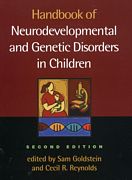
|
Handbook of Neurodevelopmental
and Genetic Disorders in Children, 2nd Edition. Edited
by Sam Goldstein & Cecil Reynolds, $132.50
Recognized as the definitive reference in the field, this book addresses a broad range of biologically based disorders that affect children's learning and development. Leading authorities review the genetics of each disorder; its course and outcome; associated developmental, cognitive, and psychosocial challenges; and what clinicians and educators need to know about effective approaches to assessment and intervention. Coverage encompasses more frequently diagnosed learning and behavior problems with a genetic component as well as numerous lower-incidence neurodevelopmental disabilities.
New to This Edition:
- Incorporates the latest scientific knowledge and clinical practices.
- Chapters on oppositional disorders and mood disorders.
- Lower-incidence disorders not covered in prior edition: mitochondrial disease, major cortical anomalies, spina bifida, and inborn errors of metabolism.
|
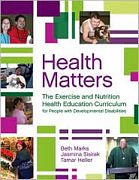
|
Health Matters:
The Exercise and Nutrition Health Education Curriculum for People
with Developmental Disabilities. Beth Marks, Jasmina Sisirak
& Tamar Heller, $76.95
Adults with developmental disabilities are at significant risk for health problems. Effective health promotion can improve outcomes — and that's why adult day and residential agencies, schools, and other organizations need this invaluable program development guide. An urgent call to action and a start-to-finish framework for health promotion, this book shows administrators and service providers how to increase supports for health education, exercise and nutrition by implementing their own successful program. |
Back to top
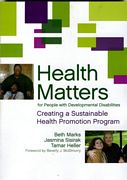
|
Health Matters
for People with Developmental Disabilities: Creating a Sustainable
Promotion Program. Beth Marks, Jasmina Sisirak & Tamar
Heller, $32.50
Adults with developmental disabilities are at significant risk for health problems. Effective health promotion can improve outcomes — and that's why adult day and residential agencies, schools, and other organizations need this invaluable program development guide. An urgent call to action and a start-to-finish framework for health promotion, this book shows administrators and service providers how to increase supports for health education, exercise and nutrition by implementing their own successful program. |
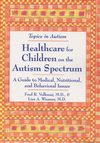
|
Healthcare for
Children on the Autism Spectrum: a Guide to Medical, Nutritional
and Behavioral Issues. Fred Volkmar & Lisa Wiesner,
$25.95
The first book of its kind, Healthcare for Children on the Autism Spectrum is a valuable guide for parents and healthcare providers alike. This practical guide offers a wide array of information on medical, nutritional and behavioral concerns from birth through adolescence. It is an essential medical reference for all families with a child on the Autism spectrum. |
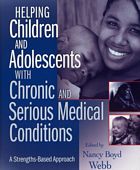
|
Helping Children and Adolescents with Chronic and Serious Medical Conditions: a Strengths-Based Approach. Nancy Boyd Webb (Editor), $72.00
Providing an innovative inter-professional model, Helping Children and Adolescents with Chronic and Serious Medical Conditions provides a multi-disciplinary approach so that practitioners from a diverse range of helping fields, working in hospitals, out-patient clinics, agencies and schools, may be better equipped to foster children's resilience and build on their emotional strengths. This is a vital tool for a broad range of health care professionals, including social workers, school counselors, play therapists, nurses, and many others. |
Back to top
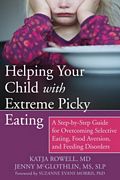
|
Helping Your Child with Extreme Picky Eating: a
Step-by-Step Guide for Overcoming Selective Eating, Food Aversion, and Feeding
Disorders. Katja Rowell & Jenny McGlothlin, $22.95
In Helping Your Child with Extreme Picky Eating,
a family doctor specializing in childhood feeding joins forces with a speech
pathologist to help you support your child's nutrition, healthy growth, and end
meal-time anxiety (for your child and you) once and for all.
Are you parenting a child with 'extreme' picky eating? Do
you worry your child isn't getting the nutrition he or she needs? Are you tired
of fighting over food, suspect that what you've tried may be making things
worse, but don't know how to help? Having a child with 'extreme' picky eating
is frustrating and sometimes scary. Children with feeding disorders, food
aversions, or selective eating often experience anxiety around food, and the
power struggles can negatively impact your relationship with your child.
Children with extreme picky eating can also miss out on parties or camp because
they can't find “safe” foods. But you don't have to choose between fighting
over every bite and only serving a handful of safe foods for years on end.
Helping Your Child with Extreme Picky Eating offers
hope, even if your child has “failed” feeding therapies before. After gaining a
foundation of understanding of your child's challenges and the dynamics at
play, you'll be ready for the five steps (built around the clinically proven
STEPS+ approach-Supportive Treatment of Eating in PartnershipS) that transform
feeding and meals so your child can learn to enjoy a variety of foods in the
right amounts for healthy growth. You'll discover specific strategies for
dealing with anxiety, low appetite, sensory challenges, autism spectrum-related
feeding issues, oral motor delay, and medically-based feeding problems. Tips
and exercises reinforce what you've learned, and dozens of “scripts” help you
respond to your child in the heat of the moment, as well as to others in your
child's life (grandparents or your child's teacher) as you help them support
your family on this journey. This book will prove an invaluable guide to
restore peace to your dinner table and help you raise a healthy eater. |
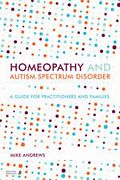
|
Homeopathy and Autism Spectrum Disorder: a Guide for
Practitioners and Families. Mike Andrews, $27.95
Homeopathy can be an effective way to manage aggression,
improve physical health problems and enhance overall wellbeing in people with
Autism Spectrum Disorder (ASD). This book presents the clinical experiences of
homeopaths working with autism around the world, exploring the real clinical
outcomes that are being achieved in practice. It will be compelling reading for
homeopaths, other healthcare professionals, teachers, parents and all those who
come in to contact with children and adults with Autism Spectrum Disorder. |
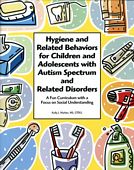
|
Hygiene and Related
Behaviors for Children and Adolescents with Autism Spectrum and
Related Disorders: a Fun Curriculum with a Focus on Social Understanding.
Kelly Mahler, $30.95
Beyond showers and tooth brushes — this fun
and ready-to-use curriculum stresses the role of perspective-taking
and the social impact of good hygiene.
|
Back to top
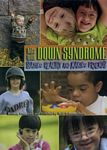
|
Kids With Down Syndrome: Staying Healthy
and Making Friends DVD. Will Schermerhorn, $34.95 (120
minutes)
Kids With Down Syndrome: Staying Healthy and Making Friends brings together parents and professionals from around the world to give a comprehensive guide to the health and social challenges — from the toddler years to adolescence
- Part One/Staying Healthy includes current and practical information on potty training, nutrition, hearing, sleep issues, exercise and general health care.
- Part Two/Making Friends looks at the steps to independence, building conversation skills, friendships, behavior and life with Down syndrome.
|
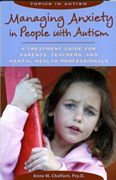
|
Managing Anxiety in People with Autism: a Treatment
Guide for Parents, Teachers and Mental Health Professionals. Anne Chalfant, $23.95
Anxiety is one of the biggest challenges
facing people with autism spectrum disorders (ASD) and their families. They can
experience anxiety in all areas of their lives — school, family, and social
life — and it compounds the difficulties they already may have with
communicating, interacting socially, and controlling their emotions. MANAGING
ANXIETY IN PEOPLE WITH AUTISM is one of the first books to provide practical
information about dealing with anxiety in people with ASD.
MANAGING ANXIETY IN PEOPLE WITH AUTISM
explains a range of different types of strategies that can help manage and
treat anxiety in school, home, and clinical settings and takes into
consideration the different roles people play in a child's or adult's life:
parent, sibling, teacher, etc. Readers learn about ways to modify behavior
and/or the environment to indirectly reduce anxiety, as well as interventions,
such as medication or psychotherapy, which deal with symptoms directly. The
discussion of more formal interventions — psychotherapy, Cognitive Behavior
Therapy (CBT), and medication — show how these methods can target specific
anxieties. Because anxiety is generally more common in parents and siblings of
a child with ASD, the author also offers ways they too can reduce their
symptoms. |

|
Mental Health Aspects of Autism and
Asperger Syndrome. Mohammad Ghaziuddin, $27.95
The first book to address the increasingly urgent need for information about psychiatric problems in people with autism spectrum disorders (ASDs), Mental Health Aspects of Autism and Asperger Syndrome systematically explains the emotional and psychological difficulties that are often encountered with ASDs. The author, an experienced psychiatrist specializing in autism, describes each of the conditions that are commonly seen in autistic children and adults, including schizophrenia, depression, anxiety, and tic disorders, and gives sound guidance on their early detection and treatment. Easy to use and authoritative, this book is an essential tool for use by both family and professionals. |
Back to top
|
Mental Wellness
in Adults with Down Syndrome: a Guide to Emotional and Behavioral
Strengths and Challenges. Dennis McGuire & Brian Chicoine,
$33.95
Mental Wellness in Adults with Down Syndrome is an invaluable resource for parents, mental health professionals, teachers and caregivers who want to understand better how to promote mental health and resolve psychosocial problems in people with Down syndrome. This authoritative, easy-to-read guide clarifies the common behavioral characteristics of Down syndrome, how some can be mistaken for mental illness, and what are the bona fide mental health problems that occur more commonly in people with Down syndrome. In addition, the authors discuss the importance of regular assessment and how behavior and mental well-being can be affected by environmental conditions, social opportunities, and physical health. |
|
Navigating the Medical Maze with a Child with Autism
Spectrum Disorder: a Practical Guide for Parents. Edited by Sue Ming &
Beth Pletcher, $30.95
This comprehensive guide enables parents of children with
an autism spectrum disorder (ASD) to play an active and effective role in their
child's medical care from diagnosis to early adulthood. With a focus on working
with health care providers to ensure the best treatment for your child's unique
needs.
This authoritative and accessible book provides parents of children with an ASD
with the foundation of knowledge they need to become an active partner in the
medical care of their child and the map that will allow them to navigate the
complex medical world. |
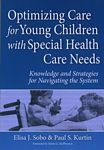
|
Optimizing Care for Young Children with Special Health Care Needs. Elisa Sobo & Paul Kurtin, $48.95
Primary care physicians and other health care providers can help families get the best care and services for young children with special health care needs (CSHCN) in this one-of-a-kind field guide to the critical issues, policies, and practices affecting medical care for CSHCN from birth to age 5. |
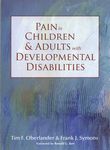
|
Pain in Children and Adults with Developmental Disabilities. Tim F. Oberlander, & Frank J. Symons, Editors, $51.95
Essential reading for a wide range of professionals across disciplines — including physicians, nurses, psychologists, rehabilitation therapists, direct care staff, and special educators — this research-based book will help professionals deliver the best possible pain management and improve the quality of life for children and adults with developmental disabilities. |
Back to top
|
The Parents’ Guide to Psychological First Aid: Helping Children and Adolescents Cope with Predictable Life Crises. Gerald Koocher & Annette La Greca, $34.50
Compiled by two seasoned clinical psychologists, The Parents' Guide to Psychological First Aid brings together articles by recognized experts who provide you with the information you need to help your child or teen navigate the many trying problems that typically afflict young people. An encyclopedic reference for parents concerned with maintaining the mental health of their children, this indispensable volume will help you help your child to deal effectively with stress and pressure, to cope with everyday challenges, and to rebound from disappointments, mistakes, trauma, and adversity. |
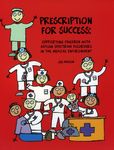
|
Prescription for Success: Supporting Children with Autism Spectrum Disorders in the Medical Environment. Jill Hudson, $26.50 (comes with CD-ROM)
Because of the unique needs of children with ASD, it is important to pay special attention to the details of their experience in the medical environment. Designed to help make the medical experience easier for all involved, this book presents information on ASD, the varying developmental levels, interventions, and assessments that medical staff, parents, educators, and key service providers can use to more effectively interact with and support children with ASD while in the medical setting. The information and techniques presented in Prescription for Success can be used by doctors, nurses, medical technicians, residents, interns, and even administrative staff to support children with ASD and their families in what can otherwise be trying circumstances. A CD at the back of the book includes forms and worksheets that can be printed and duplicated. |
Back to top
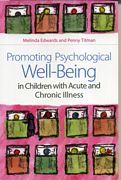
|
Promoting Psychological Well-Being in Children with Acute and Chronic Illness. Melinda Edwards & Penny Titman, $34.95
Living with a chronic illness can have a significant psychological impact on a child and his or her family, and it is essential that this aspect of their care is not overlooked.
Promoting Psychological Well-Being in Children with Acute and Chronic Illness provides a comprehensive guide to promoting the psychological well-being of children with chronic illnesses and medical conditions, covering support within health, social services and education. It discusses issues such as the impact of diagnosis and the experiences of children and their families in managing their medical condition and treatment. Strategies to support children and help them to cope with medical conditions are demonstrated, including cognitive behavioural and systemic approaches, and techniques such as relaxation and motivational interviewing. Case examples from clinical practice are given to illustrate the application of psychological ideas and frameworks to a variety of medical conditions and psychological difficulties. The book also includes a comprehensive resources section of where to look for further information. |
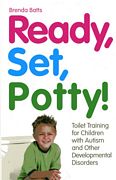
|
Ready, Set,
Potty! Toilet Training for Children with Autism and Other Developmental
Disorders. Brenda Batts, $25.95
Potty training a child with developmental disorders can be a real challenge, and sometimes the extra difficulties make you feel as though you've tried everything, and failed.
Bursting with ideas on how to see past conventional strategies and adapt toilet training to suit your child, this book outlines methods that have helped even the most despairing of parents and caregivers. Examples of success stories range from two-year-olds to adults aged 20, and show that no matter how difficult it may seem, a little creativity and adaptation can get anyone toilet trained, even when all previous attempts have failed. The program itself is supported by plenty of helpful hints and tips, and covers all you need to get your child past the diaper stage and help them to achieve a big step towards independence. |
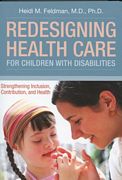
|
Redesigning Health Care for Children
with Disabilities: Strengthening Inclusion, Contribution, and Health. Heidi Feldman, $54.95
One in five families has a child with
special health care needs but medical and human service professionals often
don't get the training they need to provide long-term, integrated care for
these children. Filling a critical gap in professional education, this
groundbreaking textbook and training tool presents a comprehensive,
interdisciplinary framework for delivering effective health care to children
with disabilities and chronic illnesses. Going far beyond the traditional model
of treating and reducing symptoms, renowned pediatrician Heidi Feldman gives
professionals a big-picture blueprint for improving the lives of children with
disabilities and helping them participate fully in family and community life. Readers
will get invaluable insights on successful programs, best practices, family
concerns and experiences, professional preparation, and more. |
Back to top
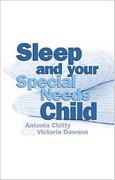
|
Sleep and Your Special Needs Child. Antonia Chitty
& Victora Dawson, $27.95
Sleep is vital for children's well-being. Without enough
sleep their health, mood, behaviour and learning ability may all be impaired.
Research shows that children with additional needs are more likely to have
sleep disorders than typically developing children, and that without
intervention these problems will persist. While most parents of babies expect
sleep problems to resolve within months, parents of children with special needs
can find them lasting into adolescence and beyond. This is a pressing issue for
parents, as disturbed sleep can cause depression, relationship problems and a
weakening of the immune system. The majority of parents receive little or no
help with sleep problems, and few families have access to sleep practitioners.
This
book addresses sleep problems using a highly successful behavioural and
cognitive approach to sleep management, and is the first book to explain these
approaches in detail. The practical advice contained is invaluable for parents
who want to feel more in control and more confident about tackling sleep issues
in a way that is appropriate for their child. |
|
Solving Sleep Problems in Children with Autism
Spectrum Disorders: a Guide for Frazzled Families. Terry Katz & Beth
Malow, $25.95
Pinpoint and solve the problems underlying sleep
difficulties and improve your entire family's quality of life with the
effective interventions found in this easy-to-understand and empathetic guide
to good sleep. Solving Sleep Problems in Children with Autism Spectrum
Disorders is based on a multi-year study of sleep in children with
ASDs which concluded that parent training was the key to resolving sleep
problems.
The authors show parents how to evaluate both daytime and
night-time habits and routines, in order to identify causes of impaired sleep
and make necessary modifications. Parents are then taught to use
strategies — social stories, visual schedules, visual cues, rewards — to help their
child get ready for bed, fall asleep, and stay asleep. |
|
Special Diets for Special
Kids. Lisa Lewis, $37.50
Over 200 gluten-free, casein-free recipes are included in this new edition of Special Diets for Special Kids. Combining volumes 1 and 2 into a new and updated edition, this jam-packed resource includes information on the latest research into the effects of diet for children with autism, ADHD, allergies, celiac disease and more. The recipes are easy to make and delicious. Best of all — this new edition comes with a CD-ROM of printable recipes. |
Back to top
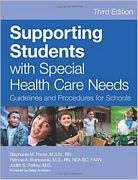
|
Supporting Students with Special Health Care Needs:
Guidelines and Procedures for Schools, 3rd Edition. Stephanie Porter,
Patricia Branowicki, Judith Palfrey, $70.95
Essential for every school health office, this fully
illustrated reference is the ultimate guide to caring for and supporting
children with special health care needs in educational settings. A
comprehensive update of the classic guide school nurses trust, this
authoritative book compiles the latest guidelines on working with
students with special health care needs, step-by-step procedures for
using today's medical technologies, and access to more than 50
reproducible planning forms and checklists. Experts from nursing,
medicine, and parent advocacy across the country reviewed and vetted the
content, so you can implement the techniques and guidelines with confidence. A
must for school nurses and related professionals, this practical reference tool
will help schools deliver the services and supports that promote health,
safety, and success for children with special health care needs. |
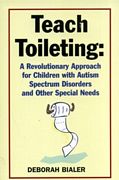
|
Teach Toileting. Deborah Bialer, $21.95
A revolutionary approach for children with autism spectrum disorders and other special needs. |
|
Therapeutic Activities for Children and Teens Coping with Health Issues. Robyn Hart & Judy Rollins, $54.95
Building on children's natural inclinations to pretend and reenact, play therapy is widely used in the treatment of psychological problems in childhood. This book is the only one of its kind with more than 200 therapeutic activities specifically designed for working with children and teenagers within the healthcare system. It provides evidence-based, age-appropriate activities for interventions that promote coping. The activities target topics such as separation anxiety, self-esteem issues, body image, death, isolation, and pain. Mental health practitioners will appreciate its “cookbook” format, with quickly read and implemented activities. |
Back to top
|
Therapeutic Massage and Bodywork for Autism Spectrum Disorders: a Guide for Parents and Caregivers. Virginia Cowen, $22.95
Massage techniques are widely and effectively used in treatment of autism spectrum disorders (ASDs) to address sensory issues, motor problems and touch receptivity. This practical guide explains how massage works, how the body senses touch, and how touch therapy can benefit children with ASDs. With recommendations for selecting the right style of massage, advice on locating a practitioner, and tips on preparing a child with an ASD for massage, this book is the perfect resource to find a therapy — or combination of therapies — to suit the individual needs of each child. |

|
Toilet Training and the Autism Spectrum: a Guide for
Professionals. Eve Fleming & Lorraine MacAlister, $28.95
This practical guide equips practitioners to support
families and carers in developing effective toilet training programmes and
provide continued help with analysing and addressing problems that occur. With
appropriate intervention and persistence most children on the autism spectrum
can be toilet trained, however difficult it may sometimes seem at first.
Eve Fleming and Lorraine MacAlister are specialists on continence problems in
autism and have packed their expertise into this accessible guide. Focusing on
the 3 'Ps' — preparation, practicalities and problem-solving — they offer a
step-by-step process tailored for children with autism, which includes
strategies for managing behavioural issues, approaches to address sensory
sensitivities and advice on overcoming specific bowel and bladder difficulties.
It also has an invaluable chapter on approaching toilet care with older
children, and teens as they transition to adulthood.
This book will give frontline professionals the knowledge and skills to support
children with autism spectrum disorder and their families with toilet training. |
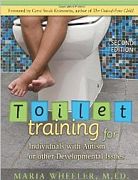
|
Toilet Training
for Individuals with Autism or Other Developmental Issues, 2nd Edition. Maria Wheeler, $26.95
Maria Wheeler offers effective strategies that take the child’s sensibilities into account rather than trying to make traditional methods fit the child. Tips, case examples, and cautions help make the process more of a lesson and less of a battle for all involved. Practical and comprehensible, this book will help guide families and caregivers working with children and youth in a supportive and compassionate manner. |
Back to top
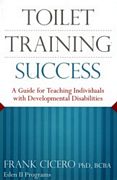
|
Toilet Training Success: a Guide for
Teaching Individuals with Developmental Disabilities. Frank Cicero, $17.50
TOILET TRAINING SUCCESS is a
helpful guide for effective toilet training interventions for individuals of
different ages, and with a wide range of development disabilities.
This practical handbook tackles one of the most important daily living skills:
toilet training. Comprehensively written, this book guides parents and
professionals from the beginning of the toilet training process to the end, from
knowing necessary pre-requisite skills, to doing a complete skills assessment,
followed by detailed descriptions of the steps necessary for basic toilet
training and bowel training processes. Dr. Cicero then tackles the issues of
independent request training, the problem of and treatment for regression, as
well as overnight toilet training.
Each section is divided into clear and
understandable parts, and feature call-out boxes that list important points
discussed in that section for easy reference. Users of this guide have the
flexibility to tailor toilet training interventions to their students needs,
using all or some sections of the book. TOILET TRAINING SUCCESS also features
an extensive FAQ section covering a range of common questions and concerns, as
well as a helpful appendix with sample training charts, data collection table,
and example training programs. |

|
The Weighted Blanket Guide: Everything You Need to
Know about Weighted Blankets and Deep Pressure for Autism, Chronic Pain, and
Other Conditions. Eileen Parker & Cara Koscinski, $21.95
Providing everything you need to know about the use of
weighted blankets to help with sensory integration, improve sleep, ease chronic
pain and more, this book includes:
- What a weighted blanket is and how it works
- An exploration of deep pressure and how weight on the
body affects the mind
- Guidelines for using weighted blankets at home and in
professional environments
- Studies into the effectiveness of weighted blankets
- Advice on how to select an appropriate weighted blanket
or sew your own.
Based on the latest research, this book dispels the
online myths surrounding weighted blankets. It delivers clear information for
occupational therapists and anyone considering using a weighted blanket to help
with sensory processing disorder, autism, sleep disorders, fibromyalgia,
post-traumatic stress disorder, and more. |
Back to top
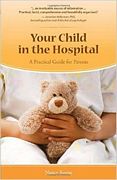
|
Your Child in the Hospital: a Practical Guide for
Parents. Nancy Keene, $17.95
No parent likes to think about their child having to go
to the hospital. But it happens––more than 3 million children are hospitalized
each year in the United States. Whether a child needs stitches, outpatient
surgery, or a long stay in the hospital, Your Child in the Hospital describes
how parents can make the most of the facilities, liven up the atmosphere, and
even have some fun. It explains how to:
- Prepare your child
- Cope with procedures
- Plan for surgery
- Communicate with doctors
- Deal with bills and insurance
It is also full of sensible tips as well as suggestions
about what to pack, helpful books to read beforehand, and even how to get free
plane rides for specialty care. Woven throughout the text are dozens of
practical and encouraging stories from parents of hospitalized children. When
you are packing the stuffed animals and pajamas to take to the hospital, make
sure to take this book with you! |
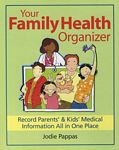
|
Your Family Health
Organizer: Record Parents' and Kids' Medical Information All in
One Place. Jodie Pappas, $21.95
A 3-ring organizer for the entire family's vital medical data, this remarkably user-friendly organizer ensures that accurate medical records for every member of the family, especially children, are carefully filed and readily available. Your Family Health Organizer has a separate section for each family member. The organizer provides space for recording all the family's medical information, including:
- Identification profiles, allowing for fingerprints of each person for security and safety
- Medications prescribed and any reactions to them
- Wellness checkups, immunizations, doctor's appointments
- Tracking information for each child's growth and other milestones
- Tracking information for baby teeth, dental appointments and results
- Dates and other details of hospital stays
This organizer accommodates two parents and as many as three children. More profiles can be ordered. Convenient plastic zippered pockets allow for filing of all insurance cards, appointment cards and other loose items. |
Back to top

Didn't
find it...?
Not sure...?
Need a suggestion...?
There are over 10,000 titles listed on our website and more than 35,000 titles in our inventory. If you haven't found what you want on the website — and it's one of our specialties — chances are good that we carry it, or can get it for you. Just let us know what you're looking for.
Call us toll-free 1-800-209-9182
or e-mail
PARENTBOOKS
is pleased to invoice institutions. Please inquire regarding terms and
discounts. Shop in person, by phone, fax, mail or e-mail . VISA, Mastercard
and Interac are welcome. We are open from 10:30 to 6:00 Monday through Friday and from 11:00 to 5:00 on Saturday.
 All prices are in Canadian dollars
and are subject to change without notice. All prices are in Canadian dollars
and are subject to change without notice.

|